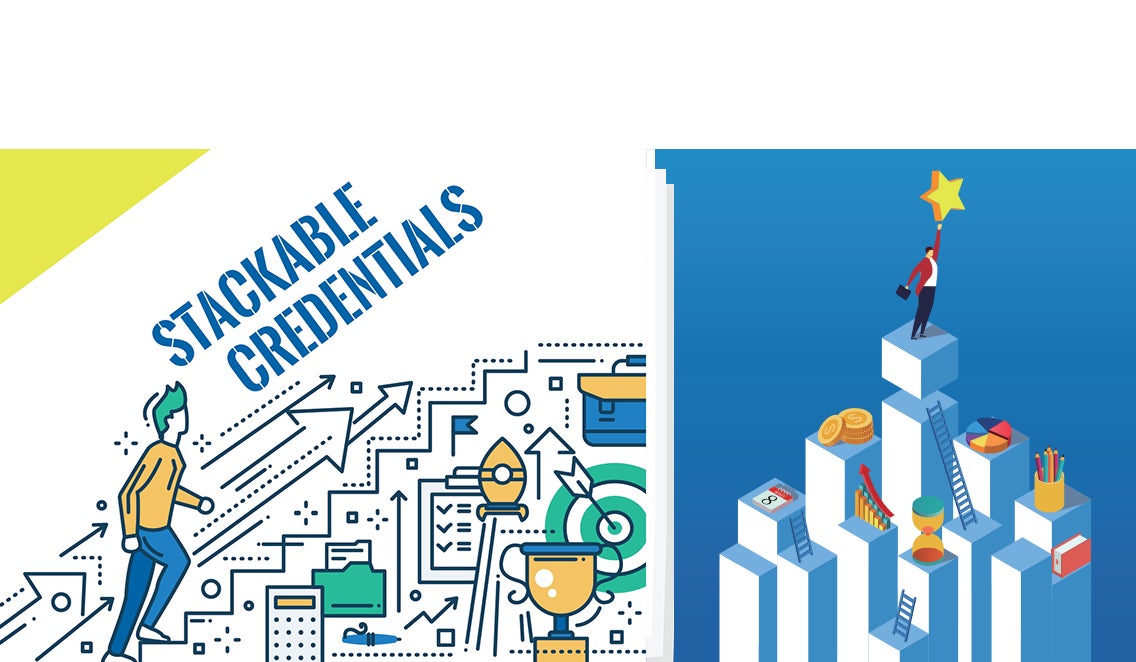A single stable career is an artifact and Rolodex schooling its platform. Stackable credentials where qualifications are fitted together like Lego bricks is a new frontier. The unbundling of education content into smaller components is mimicking the music industry that once released an album of songs but now disaggregates its content- streaming single tracks across portals like Spotify.
Technology permits the user/learner to consume tracks/courses from various ‘Labels’ or institutions and even configure a personalized playlist of content from as many producers as are available. The degree is the album. The courses are the tracks and the songs can come from faculty anywhere in higher education and can be standardized for quality by Degreed, a Central Bank of Credentials – or by Credly, a credentialing platform.
It’s the age of Amazon in Education. Students can post instant feedback on platforms not dissimilar from TripAdvisor and can get suggestions on what courses others may have selected from features, not unlike Amazon’s personalized product recommendations, Netflix’s suggested movies to watch, Pandora’s next song to stream. Students may even find teachers the way Facebook or LinkedIn help users to find people they may wish to connect with or to learn from. Collaborative filtering will be the undercarriage of this personalized content management system. The classical model of a burst at the start and top-ups in the workplace has faded. Strategies to push more people into ever-higher levels of education as a reliable means of meritocratic advancement are generating graduate glut. Pseudo-jobs are shrinking and on-the-job-training has fallen by roughly 50% in the past two decades across the UK and the US. Self-employment is flourishing as people take responsibility for honing existing skills and learning new ones to become competitive within the global war for talent.
Today the market is innovating and allowing people to learn and earn in original ways. Kai-Fu Lee, Google’s former head of Chinese operations who now runs Innovation Ventures in Beijing, knows that the days when Chinese innovation meant counterfeits and copycats have ended and is investing in education technology. There are now 609 billionaires in China compared with 552 in America. Today anything that is not moving at the speed of China is behind. Even innovation moves faster in China. China’s 89 unicorns (startups valued at $1bn +) are worth $30bn and the stellar performance of China’s richest cities in international tests of ability in mathematics, science, and reading has given the dragon a global glow. The conflict in China, however, is between curricula that favor cramming over creativity as it prepares its youth for jobs that don’t exist as yet. 85% of the jobs that will exist in 2030 have not been invented as yet and instead of expecting workers to be burdened to find work, work will compete for the best resource to complete the job. No need for loyalty- everything is liquid. In a liquid life, there are no eternal bonds, and any that we take up for a time must be tied loosely so that they can be untied again, as quickly and as effortlessly as possible, when circumstances change and even over and over again, according to Bauman. Seepage of pupils into private institutions that drill for foreign university entry persists since the left-handed-thinking they are known to foster reverberates well with China’s new mantra- ‘I am a Maker’.
Recently, there has been a rise in schools that use less structured approaches with about 70 Waldorfs across China’s big cities like Chengdu. Prosperity has also bred a penchant for the parochial. Schools now offer instruction in Confucianism, archery, and Chinese Medicine just as Sanskrit is featured at St James’ Independent Schools in London. A 2017 survey by of 21st Century Education Research Institute, a think-tank in China, found that a mere 6000 families have opted for educating their children exclusively at home and this trend is rising by about one-third each year.
The old slipway of West Indian schooling that once launched lives into the Wide Sargasso Sea of single stable careers is no match for crowdsourcing and offshoring. The future of work is waiting for those who can bring questions because the ability to master new knowledge will be more valuable than the knowledge itself.


Leave a Reply